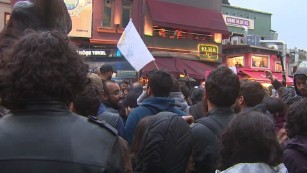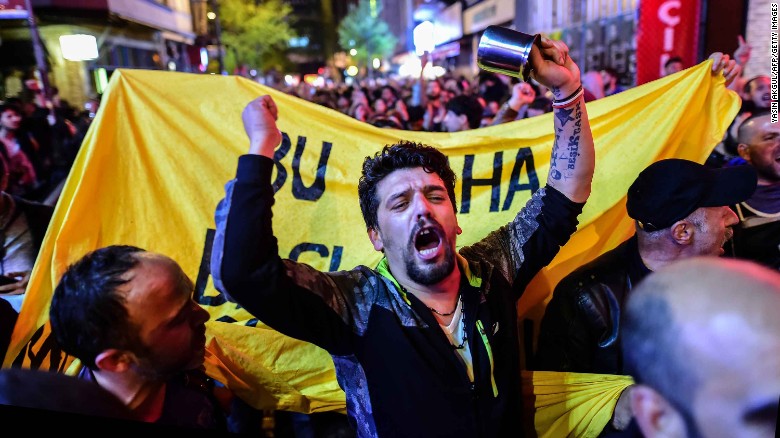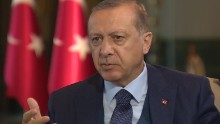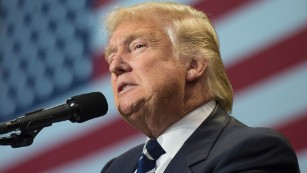Turkey's electoral board rejects calls to annul referendum
Turkey's top electoral board overwhelmingly rejected objections to the way the country's referendum was run, semi-official Anadolu news agency reported Wednesday.
A narrow majority of voters in Sunday's referendum backed the 18-article constitutional reform package, which will transform the country's parliamentary system into a powerful executive presidency.
The main opposition Republican People's Party (CHP), along with individuals and civil society groups, challenged the result amid concerns over unstamped ballots and called for it to be annulled.
After considering their complaints, the electoral body ruled by 10 to one to deny the objections put forward by the CHP and hundreds of individuals, Anadolu said.

Turkish demonstrators protest vote result
Protesters marched for the third night in a row Wednesday in cities across the country in support of the annulment petition. On the Asian side of Istanbul, men and women of all ages took to the streets after sunset, carrying signs declaring "Hayir," or "No," and chanting "We will resist."
Prominent political activist Abdurrahman Atalay was detained Wednesday along with 16 other people, according to Zeynep Atalay, his cousin and one of his lawyers. No official charge has yet been laid against the activist, his cousin said, but they believe his detention is related to the "no" campaign he was running.
Calls to leave it be
The reform plan, put forward by the ruling Justice and Development Party (AKP), will give President Recep Tayyip Erdogan sweeping and largely unchecked powers.
Prime Minister Binali Yildirim, speaking on CNN Turk, urged the opposition to drop its challenge.
"Objection to election results should remain there," he said. "The opposition should not call people to take to the streets and say they do not recognize election results."

'No' supporters gather in Istanbul to protest Sunday after the results of the referendum.
But Bulent Tezcan, deputy chairman of the CHP, told reporters Monday that the party would appeal to the European Court of Human Rights if the electoral body didn't void Sunday's referendum result.
"The only decision that will end the legitimacy debate and ease people's concerns about the judiciary is for the High Election Board to cancel the referendum," Tezcan said.
Turkey referendum: What happened and what comes next
Unsealed ballots
Voting was already underway on Sunday when the electoral authority announced it would start accepting unstamped ballots -- a decision that the opposition said should invalidate the results.
The stamps were required to avoid "ballot-stuffing" -- where extra votes are cast illegally to manipulate results -- and unstamped ballots had been dismissed as invalid in earlier votes.

Erdogan expands power and promises new era
International election monitors also delivered a scathing verdict on the conduct of the referendum. Representatives from a coalition of international bodies said the vote took place on an "unlevel playing field," with the "yes" campaign dominating media coverage.
Delivering the report, Tana de Zulueta, head of the OSCE Office for Democratic Institutions and Human Rights, said the "No" campaign had been restricted and that the electoral authority unfairly changed the rules after polls had opened.
47,155 arrests: Turkey's post-coup crackdown by the numbers
She confirmed that the authority decided to accept ballots without official stamps late in the day, adding that it "significantly changed the ballot validity criteria, undermining an important safeguard and contradicting the law."
The referendum results cement a yearslong effort by Erdogan -- who has served as President since 2014, following nearly a decade as Prime Minister -- to consolidate his position.
A failed coup last year allowed him to turn up the heat on opposition voices in the run-up to Sunday's vote. The "no" campaign said it faced intimidation and threats of violence, while opposition figures and journalists were jailed.
Erdogan: 'I am a mortal really'
But Turkey's President has insisted that his plans to assume do not make him a dictator and that the changes were not about empowering him.

CNN exclusive with Turkey's President Erdogan
"I am a mortal really, I could die at any time," he told CNN's Becky Anderson inside Ankara's presidential palace Tuesday, in his first interview since the vote.
Erdogan rejected accusations that he supported the new powers out of a desire to empower himself rather than improve Turkey's political system. "The system represents a change, a transformation in the democratic history of Turkey," he said.
Under the revised constitution, Erdogan will be able to abolish the post of Prime Minister and assume broad new powers to rule by decree. The new arrangements will give him the power to appoint a cabinet and some senior judges, and the power of parliament to scrutinize legislation will curbed.
Want Donald Trump to say nice things about you? Say nice things about him
Unlike European leaders who expressed reservations about the referendum, US President Donald Trump telephoned Erdogan to congratulate him on his victory.
The two leaders will meet in May, Turkish Foreign Minister Mevlut Cavusoglu said at a press conference carried by CNN Turk on Wednesday. "After our president and Trump confirmed a meeting in May, [US Secretary of State Rex] Tillerson and I will set a date," Cavusoglu said.
There has been no official word from the White House on any planned meeting between Trump and Erdogan.
The latter told CNN on Tuesday that he wanted to meet with Trump. "It would be better to have (a) face-to face meeting and take forward our relationship," Erdogan said.
News COurtesy: www.cnn.com













